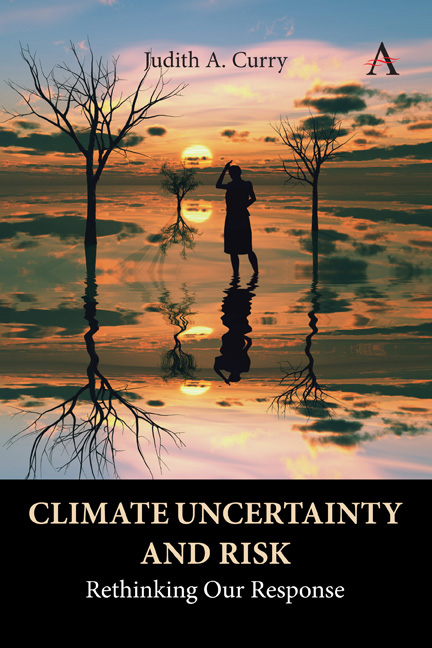Chapter Eight - Alternative Methods for Generating Climate Change Scenarios
Published online by Cambridge University Press: 28 February 2024
Summary
“When it comes to thinking about the impacts of climate change, we must guard against a failure of imagination.”
—Center for Naval Analyses Military Advisory BoardThere is a growing realization that global climate models are not fit for the purpose of predicting twenty-first century climate variations and change, particularly on decadal and regional scales (Sections 6.3.4, 6.4). Climate model simulations under the auspices of the CMIP program and the IPCC are not providing the full range of scenarios of plausible climate outcomes. The CMIP simulations include very limited scenarios of volcanic eruptions and solar variability. Further, the climate models have inadequate representations of solar indirect effects and multi-decadal to century scale variations in the large-scale ocean circulations. Natural internal climate variability is of particular importance for scenarios of regional climate variations.
There is a need for alternative science-based frameworks for developing scenarios of climate futures, particularly with regard to regional extreme weather and climate events. The framework presented here has an indirect role for climate model simulations in developing scenarios of climate futures, but utilizes a broader range of methods for generating scenarios. Statistical and network-based models, data-driven scenarios, and speculative but physically-based what-if scenarios are also used in scenario generation. This alternative scenario framework reflects a shift away from median and likely values to a possibility framework for scenarios that accepts all outcomes that are not judged to be implausible by our current background knowledge.
The rationale for the scenario generation methods described in this chapter is provided by the risk governance framework that is discussed in Part Three of this book. A broad range of justified scenarios, along with expression of uncertainties, provide inputs for robust decision-making. Robust decision-making incorporates scientific uncertainty into the decision-theoretic framework as knowledge, not ignorance.
Escape From Model-Land
“Letting go of the phantastic mathematical objects and achievables of model-land can lead to more relevant information on the real world and thus better-informed decision-making.”
(Computer modeler Erica Thompson, author of Escape from Model-Land)“Model-land” is a world in which mathematical simulations are evaluated against other mathematical simulations. Decision support in model-land implies taking the output of model simulations at face value, and then interpreting the frequencies from model-land to represent probabilities in the real world.
- Type
- Chapter
- Information
- Climate Uncertainty and RiskRethinking Our Response, pp. 97 - 116Publisher: Anthem PressPrint publication year: 2023

